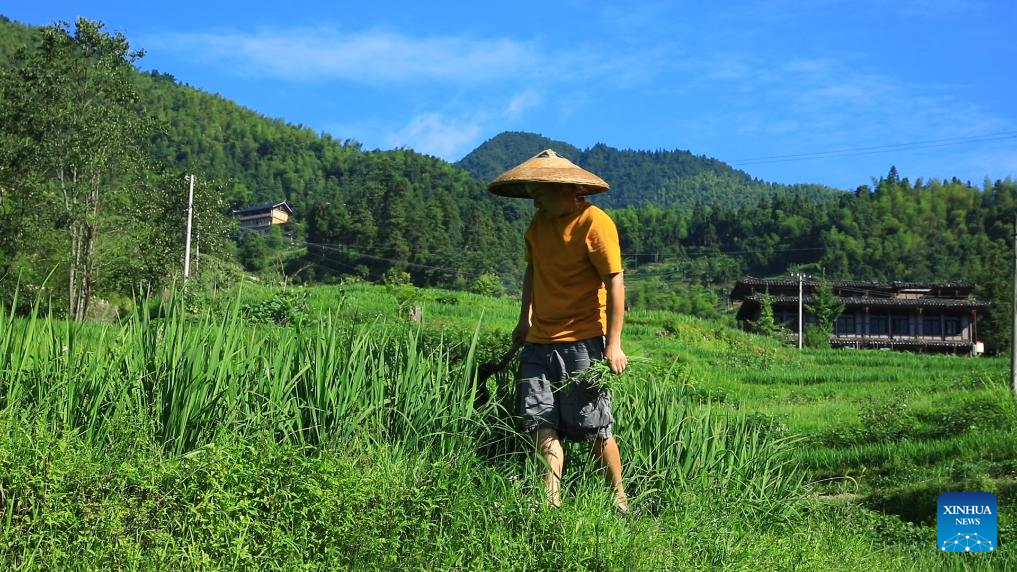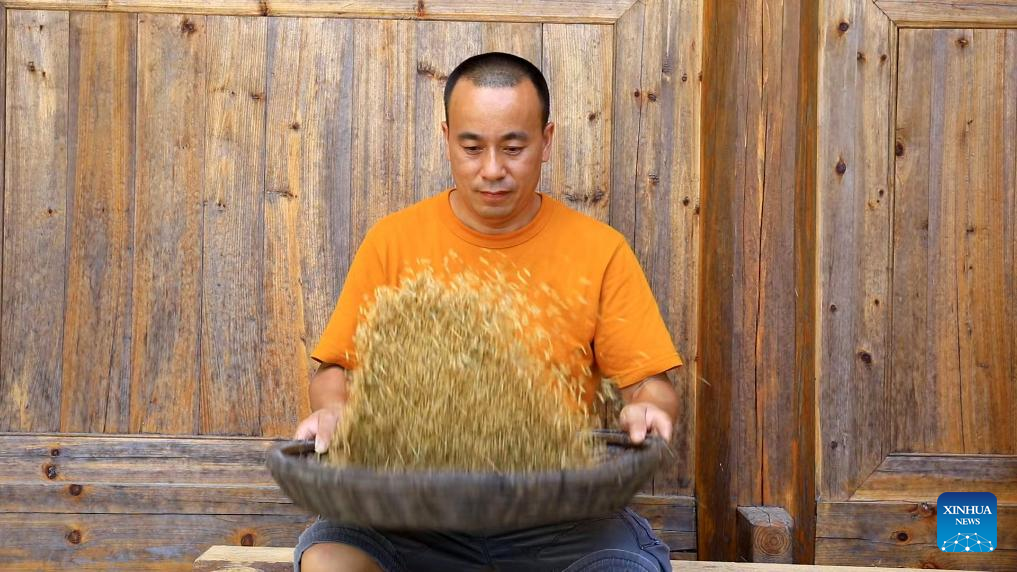
Luo Zhonglin checks the growth of rice seedling at a rice paddy in the Ziquejie terraces of Xinhua County, central China's Hunan Province, July 23, 2022. (Xinhua)
CHANGSHA, Sept. 28 (Xinhua) -- Standing on the edge of a rice paddy, Luo Zhonglin grips a handful of golden, ripe rice stalks and forcefully strikes them against a bucket. One by one, the plump, golden grains fall into the container.
It is harvest season in the Ziquejie terraces of Xinhua County, central China's Hunan Province. These terraces, designed to follow the natural contours of the hills, vary in size, snaking like ribbons across the landscape.
Despite the picturesque landscape here, the terraces once struggled to retain local residents. Over the years, the allure of the big cities drew many young people away, promising job opportunities and modern amenities that rural areas often lacked.
Luo was one of the youths who defied this trend. A decade ago, he abandoned a high-paying city job to return to farming, despite facing objections from his family. On his return, Luo set out on a quest to find and protect "old seeds" -- those that produce ancient food varieties with a unique taste that are rarely found in the cities.
His seed venture eventually took off. Today, Ziquejie's rich agricultural heritage, coupled with innovative initiatives like Luo's old-seed preservation project, has breathed new life into the terraced landscape.
"When I was a child, our family was poor, and I thought farming was a tough job. I always wanted to finish the work quickly, hoping to leave this remote mountainous region as soon as possible and never have to deal with the fields again," recalled Luo.
However, his perspective changed over the years, as the Ziquejie terraces gained increasing recognition through continuous conservation and development efforts.
With a history dating back over 2,000 years, the Ziquejie terraces boast a distinct irrigation system and breathtaking views throughout the seasons, attracting plenty of tourists.
On a trip back to his hometown in 2013, Luo was impressed by the beautiful rural environment and the nostalgic taste of "old cucumber," a traditional local cucumber variety with unique flavors that he had not tasted for years, working in the big cities.
From then on, Luo decided to stay and revive the old seeds, bringing those nostalgic flavors to more people.
"Seeds are the 'chips' that power agriculture. Protecting seeds is safeguarding our heritage and preserving our history," said Luo.
He began searching far and wide for traces of these old seeds, scouring nearby villages and even venturing to other counties, collecting over a dozen varieties. Over time, he discovered rice varieties that thrived in Ziquejie's climate and soil, producing crops that were resistant to diseases and insects, with aromatic, flavorful grains.
In 2018, to encourage more farmers to join in planting these old seeds, Luo founded a cooperative. Despite initial skepticism, the cooperative now boasts 35 members, producing high-quality Ziquejie terrace rice.
Last year, the cooperative produced over 10,000 kg of rice, with an average price of nearly 40 yuan per kg, a premium figure.
"Our ancient ancestors in Ziquejie have sustained themselves through such farming methods, and we want to preserve and pass down this gift," Luo said.
Currently, Luo is preparing a museum for the seeds, hoping to introduce and display old seeds to visitors to Ziquejie in the future.
"There is great potential in the countryside, and I want to work hard to protect these beautiful terraced fields," he said. ■

Luo Zhonglin checks the growth of rice seedling at a rice paddy in the Ziquejie terraces of Xinhua County, central China's Hunan Province, July 23, 2022. (Xinhua)

Luo Zhonglin sifts grains in the Ziquejie Village of Xinhua County, central China's Hunan Province, July 23, 2022. (Xinhua)



